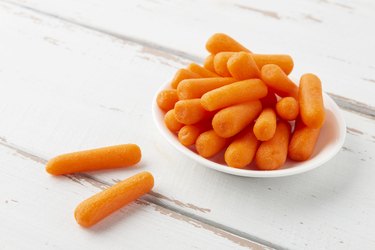
Baby carrots are reputed to be a healthy, nutrition-packed snack. But how many calories are in one single baby carrot, exactly? And how do baby carrots' calories and nutritional values compare to regular carrots'? Do both kinds of carrots have vitamin A and fiber? Are baby carrots really good for you?
Read on to learn more about baby carrots' calories and nutrients, and to find out how baby carrots compare with regular-sized carrots nutrition-wise.
Video of the Day
Video of the Day
Baby Carrot Calories
The U.S. Department of Agriculture's FoodData Central database gives a single baby carrot two different calorie values, based on the baby carrots' size. A large baby carrot -- defined as weighing 15 grams -- has 5.25 calories, while a medium baby carrot — one that weighs 10 grams — has 3.5 calories.
That means that snackers who eat 10 baby carrots in one sitting are taking in 52.5 calories if the baby carrots are large, and 35 calories if the baby carrots are medium-sized.
Either way, the crunch of baby carrots is so satisfying, you just might be able to swap them for potato chips! But beware: If you dip your baby carrots into a savory sauce or dressing — or sauté them in butter or oil — you will add both fat and calories to those beautiful little babies.
Tip
Per the USDA, one tablespoon of ranch dressing has 65 calories and 7 grams of fat. For a healthier dip, mix plain low-fat yogurt with your favorite dried or fresh herbs and seasonings.
Baby Carrot Nutrition
If food prices were based on nutritional value, the humble baby carrot would be far more expensive. Check it out:
Beta-Carotene and Vitamin A
Like regular-sized carrots, baby carrots get their bright orange hue from beta-carotene, an antioxidant that defends cells from damaging molecules known as free radicals. According to research published by the Icahn School of Medicine at Mount Sinai, carrots in general are one of the richest dietary sources of beta-carotene available.
"In the body, beta-carotene converts into vitamin A," they explain. "We need vitamin A for good vision and eye health, for a strong immune system, and for healthy skin and mucous membranes."
Per the USDA, one medium baby carrot contains 639 micrograms of beta-carotene and 1380 international units of vitamin A.
Lutein and Zeaxanthin
The American Macular Degeneration Foundation (AMDF) recommends baby carrots as a good source of the carotenoids lutein and zeaxanthin, which "may decrease the risk of developing advanced age-related macular degeneration and even cataracts."
One single medium baby carrot contains 35.8 micrograms of lutein and zeaxanthin, which are usually measured together, the AMDF explains.
Dietary Fiber
Like regular carrots, baby carrots are high in fiber. One single large baby carrot contains almost half a gram of dietary fiber, per the USDA.
According to the Mayo Clinic, dietary fiber is essential for a healthy diet because it not only prevents constipation but helps with "maintaining a healthy weight and lowering your risk of diabetes, heart disease and some types of cancer."
Baby Carrots vs. Regular Carrots
Think "baby carrots," and you probably picture the bag of cute little cut and peeled carrots you see at the grocery store. Those are simply regular carrots that have been peeled and shaped into snack-sized portions — and that's what we focused on in this piece.
- U.S.Department of Agriculture: "Carrots, Baby, Raw"
- U.S. Department of Agriculture: "Historical Record — Ranch Dressing"
- Icahn School of Medicine at Mount Sinai: "Beta-carotene"
- American Macular Degeneration Foundation: "Lutein for Preventing Macular Degeneration"
- American Macular Degeneraton Foundation: "Zeaxanthin for Preventing Macular Degeneration"
- Mayo Clinic: "Dietary Fiber: Essential for a Healthy Diet"